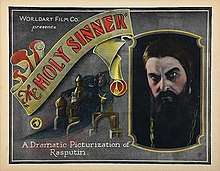Rasputin, the Holy Sinner
Rasputin, the Holy Sinner (German:Rasputins Liebesabenteuer) is a 1928 German silent film directed by Martin Berger and starring Nikolai Malikoff, Diana Karenne and Erwin Kalser.[1] The film was also released as Rasputin, the Holy Devil and Rasputin's Amorous Adventures. Director Berger made Rasputin into a sympathetic peasant character who was "exploited by the boorish and overly pampered bourgeoisie". [2]
| Rasputin, the Holy Sinner | |
|---|---|
 American release poster | |
| Directed by | Martin Berger |
| Produced by | Martin Berger |
| Written by | Dosio Koffler |
| Starring | Nikolai Malikoff Diana Karenne Erwin Kalser |
| Music by | Pasquale Perris |
| Cinematography | László Schäffer |
Production company | Martin Berger Film |
| Distributed by | Mondial-Film |
Release date | 26 September 1928 |
Running time | 60 minutes |
| Country | Germany |
| Language | Silent German intertitles |
The film was one of Berger's biggest productions according to its budget and boasted a distinguished cast, including Alfred Abel and Max Schreck.[2] Russian-born actor Nikolai Malikoff received glowing reviews for his portrayal of Rasputin, although his film career petered out soon after due to the advent of sound. (This film is sometimes confused with a 1928 German-Russian film called Rasputin (1928 film).)[2]
Plot
A simple Russian peasant named Gregori Rasputin seems able to perform miracles and soon comes to the attention of the Tsar and Tsarina of the Russian royal family who elevate him to the rank of spiritual advisor. Rasputin's control over them grows, and members of the hierarchy fear he is trying to increase his own political power. They develop a plot to assassinate Rasputin.
Cast
- Nikolai Malikoff as Rasputin
- Diana Karenne as Zarin
- Erwin Kalser as Zar
- Alexander Murski as Postmeister Globitscheff
- Nathalie Lissenko as Frau Tatarinoff
- Albert Kergy as Adjutant Bilinski
- Alfred Abel as Generaladjutant Sablin
- Mikhail Rasumny as Purischkewitsch
- Hilde Hildebrand as Dirne Gregubowa
- David Monko as Minister Sassonow
- Camilla von Hollay as Dienstmädchen Dunja
- Ferdinand Bonn as Jegoroff
- Max Schreck as Nikolai Nikolajewitsch
- Uli Buotry as Militza Nikolajewitsch
- Jack Trevor as Prince Youssoupoff
- Hans Albers as Ein Offizier
- Hermann Picha as Ein Spitzel
- Fritz Alberti as Oberst Tatarinoff
- Ruth Albu as Hoffräulein Wera
- Gertrud Arnold as Mutter Bilinski
- Erna Bojar as Gymnasiastin
- Maria De Witt as Wyrubowa
- Diana Dierks as Gräfin Ignatieff
- N. Schweidel as Minister Chwostoff
- Alexandra Sorina as Schauspielerin Warwarowa
- Uli Tridenskaja as Frau Globitscheff
- Martin Wolfgang as Mitja
References
- Dalle Vacche p.262
- Workman, Christopher; Howarth, Troy (2016). Tome of Terror: Horror Films of the Silent Era. Midnight Marquee Press. p. 329. ISBN 978-1936168-68-2.
Bibliography
- Dalle Vacche, Angela. Diva: Defiance and Passion in Early Italian Cinema. University of Texas Press, 2008.